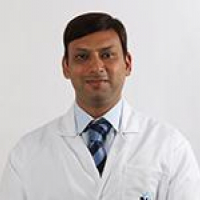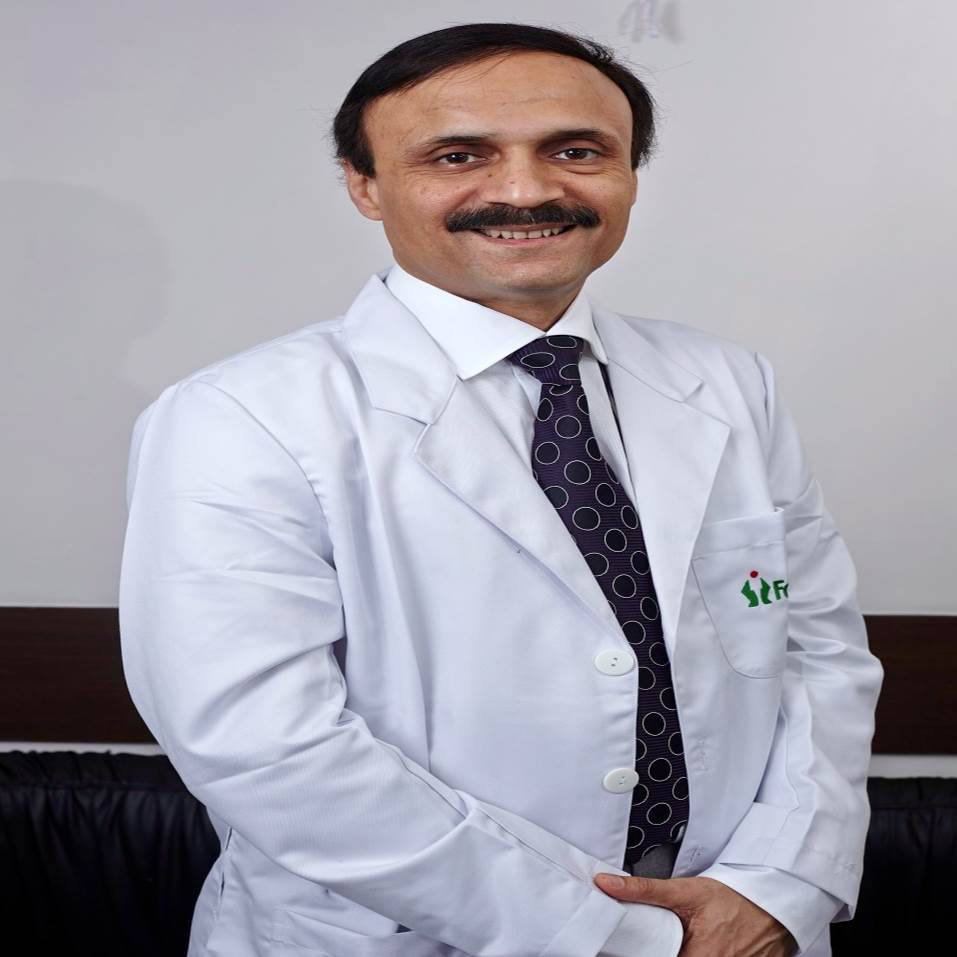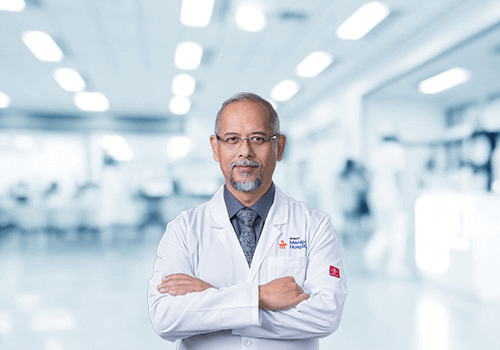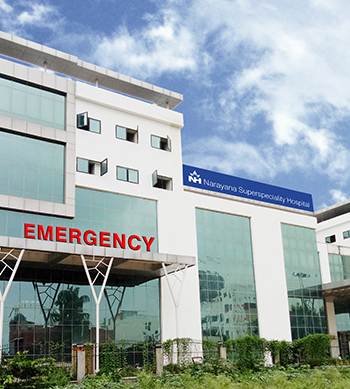About the Doctor
With more than 17 years of experience, Dr. Amit Goel worked as Clinical Assistant in Rajiv Gandhi Cancer Institute and Research Centre. He also did Fellowship in Uro Oncology and Robotic Surgery at Rajiv Gandhi Cancer Institute & Research Centre, Delhi. Also he served as Consultant in Uro- Oncology and Robotic Surgery at Rajiv Gandhi Cancer Institute and Research Centre, Delhi where he has acquired vast exposure to Open, Laparoscopic and Robotic Urology cancer surgeries. He has done Observership at M.D Anderson Cancer Center, Huoston,Texas,U.S. He also worked as Senior Consultant and Head in Apollo Hospitals Dhaka, where he was the Pioneer in many Laparoscopic Cancer surgeries like Laparoscopic Partial Nephrectomy for Kidney Tumour, Laparoscopic Radical Cystectomy for Cancer Bladder , Orthotopic Ileal Neobladder Reconstruction for Cancer Bladder, Laparoscopic Radical Prostatectomy for Prostate Cancer, Holmium Laser enucleation of Prostate (HOLEP) for Benign Prostate enlargement, and Lap Sacrocolpopexy for Vaginal Prolapse and Laparoscopic Donor Nephrectomy, Laproscopic Retroperitoneal Lymph Node dissection for Testicular tumours.
Specialization
- Kidney Transplants with Lap Donor Nephrectomies, Vascular Access for Hemodialysis Lap / Robotic/ Open Surgery for Prostate Cancer,
- Bladder Cancer:Lap/ Robotic/ Open Radical Cystectomy and Intracorporeal Ileal Conduit and Orthotopic Neobladders
- Testicular Tumours, Retroperitoneal Lymph Node Dissection for Testis Tumours,Retroperitoneal tumours
- Laparoscopic/Robotic and Open Partial Nephrectomy/ Radical Nephrectomy
- Amputation of Penis with Inguinal Lymph Node dissection for Cancer Penis
- Laparoscopic Adrenalectomy for Pheochromocytoma and Simple Tumours
- Experienced in administration of Targeted therapy for Kidney cancer, Chemotherapy for Bladder cancer, Hormonal therapy and Chemotherapy for Cancer of Prostate
- LASER surgeries for Benign Prostate Enlargement (HOLEP) and Kidney Stones RIRS Retrograde Intrarenal Surgery and Laser stone Surgeries for Ureteric and Bladder stones.
- Endoscopic Procedures for Kidney Stones (PCNL), Prostate (TURP), and Bladder tumours (TURBT),
- Laparoscopic surgeries (Benign Cases) : Lap. Donor Nephrectomy, Lap Pyeloplasty, Lap Ureterolysis for Retroperitoneal fibrosis, Lap Ureterolithotomy and Lap Pyelolithotomy, Lap Ureteric Reimplantation
- Gynecological procedures: Lap. Simple and Radical Hysterectomy and Lap. Sacrocolpopexy for Vaginal Prolapse , Trans vaginal and Trans Obturator Tape for Stress Urinary Incontinence(TOT and TVT), Vesico-vaginal Fistula Repair and Uretero Vaginal Fistula Repair.
- Buccal Mucosal Graft Urethroplasties, Optical Internal urethrotomy (OIU) for Stricture urethra,
- Open Pyeloplasty, for PUJ Obstrution other Reconstructive surgeries in Children.
Awards
- Awarded First rank by Urological Society of India in 2011 as Olympus European Resident Education Travel fellowship to Prague , Czech Republic
Frequently Asked Questions About Urology
When should I see a urologist or urogynecologist?
An individual should seek the expertise of a trained urologist or urogynecologists when he or she is coping with or experiencing symptoms of a condition of the genitourinary tract, including, but not limited to:
- Recurrent urinary tract infections
- Blood in urination
- Poor bladder control
- Urine leakage
- Difficulty urinating
- Suspicion of kidney stones
- Erectile dysfunction
- Suspicion of male infertility
What are the symptoms of the presence of kidney stones?
The presentation of symptoms depends upon the location, size, and shape of the stone. Many times they are symptom free. They are called silent stones. Common symptoms are as follows :
Sudden, severe pain- starting in the flanks and moving towards groins. Typically, described as ureteric colic and loin to groin pain
Nausea and Vomiting.
Blood in Urine.
Increased Urinary frequency.
Burning sensation on passing Urine.
Infection in Urine.
Who have greater tendency towards kidney stones?
People who tend to form stones have certain factors in common.
Those who stay in the hot environmental condition, such as tropical area.
Positive family history of the stone disease in first blood relation.
Decreases fluid intake, which reduces urine output, and forms supersaturated urine.
Various factors play a role in the formation of kidney stone in a susceptible individual. These factors are diet, water intake, urinary output, climate, occupation, and heredity, radical and family background.
What Should I Do If I Have Passed A Stone In Urine?
If you find a stone, bring it in to your doctor for analysis. The type of stone you have, will determine the diet and prevention programme your doctor recommends. You may need additional tests and X-ray in future to ensure that new stones do not form.
How can i prevent urinary stones?
A good first step for prevention is to drink more liquids – water is the best. If you tend to form stones, you should try to drink enough liquids throughout the day to produce at least two litres of urine in every 24 hours period. People who form calcium stones used to be told to avoid dairy products and other foods with high calcium content. However, recent studies have shown that foods high in calcium, including dairy foods, help prevent calcium stones. Taking calcium in pill form, however, may increase the risk of developing stones. Women taking vitamin D and calcium pills in the postmenopausal period to prevent osteoporosis, especially with family history of stones, need to be careful.
What are my chances of getting prostate cancer ?
Prostate cancer is the most common cancer among men and the second leading cause of annual cancer deaths, following lung cancer. One in 10 men will be diagnosed with prostate cancer. More than 70 percent of all prostate cancer cases are diagnosed in men over the age of 65. Black men are in the highest risk group and represent approximately 270 cases per 100,000 men. In addition, prostate cancer has the strongest familial link of all the major cancers.
How prostate cancer is typically treated ?
There are a variety of ways to treat prostate cancer including
Surgery to remove the prostate in its entirety, radiation therapy to kill the cancerous tissue in and around the prostate,
Hormone deprivation therapy to stop the production of hormones that help prostate cancer cells to grow,
Chemotherapy to stop the cancer cells from dividing and multiplying,
Active surveillance and/or watchful waiting where patients remains under strict follow up. One or more of these treatment approaches may be used by your doctors at various times and stages of the disease. There are a variety of factors that will be evaluated by your physician to determine the best treatment approach.
Is there any treatment of urinary incontinence?
Most types of urinary incontinence can be effectively treated and the symptoms improved the type of incontinence present is determined. In some patients, incontinence is often improved by weight loss. Smokers who have a chronic cough have fewer problems when they stop smoking (and stop coughing). Some common drugs can also aggravate the situation.











